
Producing over 40% of teachers in South Africa
In his inaugural lecture on 27 February 2025, Prof Ailwei Solomon Mawela, Manager: Teaching and Learning, Engaged Scholarship and Student Support in the College of Education, articulated his path towards revolutionising instructional leadership in his address titled "Innovative instructional leadership: A transformative approach toward curriculum delivery in schools".
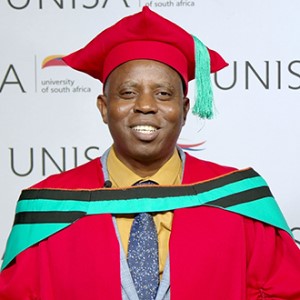
Prof Ailwei Solomon Mawela
His academic journey and path towards instructional leadership started 28 years ago in his career as an educator, where he learnt the importance and art of being persistent and resilient, and to persevere in overcoming his personal academic challenges, where time management played a pivotal role in balancing coursework, research and personal life. Having a five-year plan that was grounded in set goals assisted him greatly in his academic endeavours. Collaborating and working with peers and mentors in his academic journey highlighted the value of teamwork and the ability to accommodate diverse perspectives.
Being an educator over those years required critical thinking skills as Mawela engaged with complex problems that enhanced his analytical and problem-solving skills daily. In his address, he articulated that he had to balance his personal life and academic pursuits effectively through several key strategies, and prioritise his academic journey and responsibilities by identifying and focusing on the most critical tasks. He also relied on a robust support system, including family, friends and academic advisors, to provide the necessary assistance and encouragement.
Mawela’s research interests centred on instructional leadership in curriculum delivery in schools for effective teaching and learning that enhance students' performance within the scope of curriculum studies, open distance learning, assessment in education, open education resources, environmental education, and pedagogical strategies encompassing the study of innovative teaching methods and their subsequent impact on student learning outcomes.
His research niche area was influenced by staying informed about the latest trends and advancements in the field of curriculum and instructional studies and education in general, which remained crucial for his academic career path. Drawing from personal teaching and learning experiences provided valuable insights into his effective research practices. Mentorship from experienced academics and leaders offered essential guidance and support.
Additionally, engaging in professional development through workshops, conferences and further studies enhanced his academic prowess, skills and knowledge. His engaged scholarship project established in 2017 focused on "Instructional leadership in curriculum delivery in schools". His supervision of eight master’s and thirteen doctoral students’ dissertations and theses played a major role in shaping his research interest. He emphasised quality by maintaining high educational standards and practices, and fostered professional growth by providing constructive feedback and support to students for their development, which ultimately enhanced student outcomes through effective supervision.
Mawela’s inaugural lecture centred on the theme of innovative instructional leadership, emphasising a transformative approach to curriculum delivery in schools. It highlighted the pivotal role of innovative instructional leadership in enhancing teaching and learning practices, ultimately aiming to improve student performance. The lecture underscored the importance of leadership development in fostering effective educational leaders who can drive innovation in instructional practices.
Additionally, Mawela emphasised the critical role of policy implementation and monitoring in promoting effective curriculum delivery, advocating for the use of research-based evidence to inform educational policies and practices. Central to this approach is the focus on student success, intending to enhance student engagement, learning outcomes and overall achievement, aligning with National Development Goal number 4 (Quality Education).
Mawela strongly articulated on interdisciplinary approaches in education and emphasised the importance of cross-disciplinary learning and collaboration, fostering a more holistic understanding of complex issues. Integrating practical experience into the curriculum will ensure that students gain hands-on, real-world knowledge, enhancing their readiness for professional environments.
He further highlighted student-centred learning that prioritises personalised and adaptive strategies, catering to the unique needs and learning styles of each student. Additionally, incorporating global perspectives into the curriculum broadens students' horizons, encouraging them to consider diverse viewpoints and global issues, thereby preparing them to engage thoughtfully in an interconnected world.
Mawela is currently conducting research and collaborating with the University of Zambia, the University of Namibia and Eswatini University to establish a cultural exchange of knowledge and skills to gain more insights into different cultures and educational practices. He is currently leading a research initiative concerning innovative instructional leadership in curriculum delivery in schools in an attempt to expand the global collaboration with the SADC region to build an international network and collaborations. "These collaborations with local and international scholars provide diverse perspectives and enrich research with diverse viewpoints and methodologies concerning innovative instructional leadership in curriculum delivery in schools," he indicated. "I further intend to address global challenges by contributing to solutions for global issues through collaborative research."
In conclusion, he said: "As a full professor, I aspire to leave a multifaceted legacy encompassing impactful research, inspiring teaching, mentorship, community engagement, and institutional development. My goal is to continue pioneering research that advances new knowledge within the field of instructional leadership in curriculum delivery and address significant challenges, thereby contributing to the betterment of student performance. I also seek to lead community engagement efforts that contribute to the broader community through outreach, public lectures, publishing scholarly books, and active academic citizenship."
* By Freddy Mlambo, Communication and Marketing Specialist, College of Education.
Publish date: 2025-04-08 00:00:00.0
 National leader in mathematics education aims to improve outcomes
National leader in mathematics education aims to improve outcomes
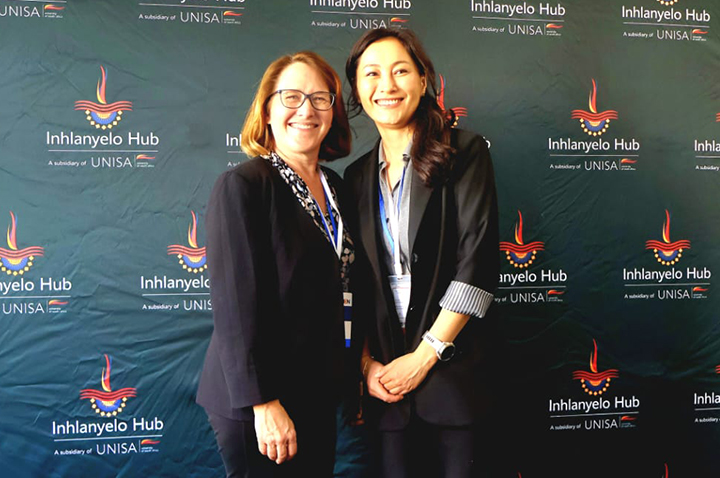 Unisa roundtable focuses on empowering SA women to lead in innovation
Unisa roundtable focuses on empowering SA women to lead in innovation
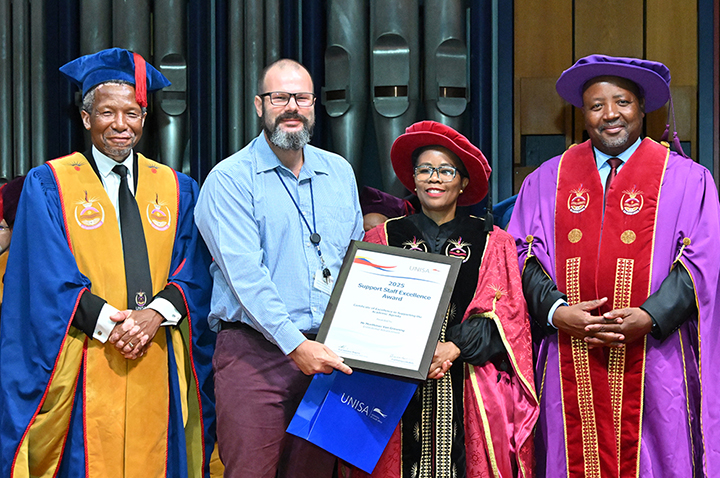 Unisan recognised for web excellence
Unisan recognised for web excellence
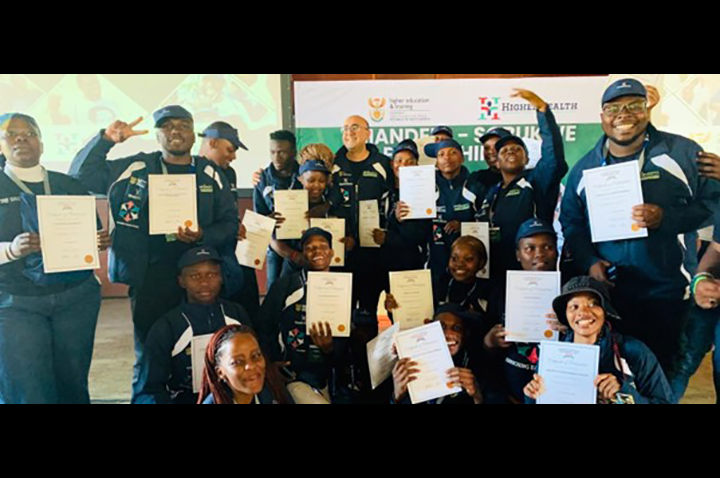 Office of the Dean of Students participates in leadership camp
Office of the Dean of Students participates in leadership camp
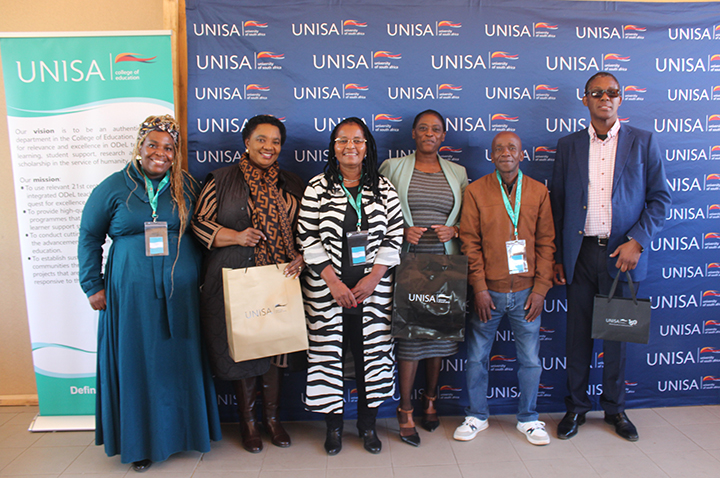 Unisa project fosters digital and pedagogical innovation in Limpopo schools
Unisa project fosters digital and pedagogical innovation in Limpopo schools